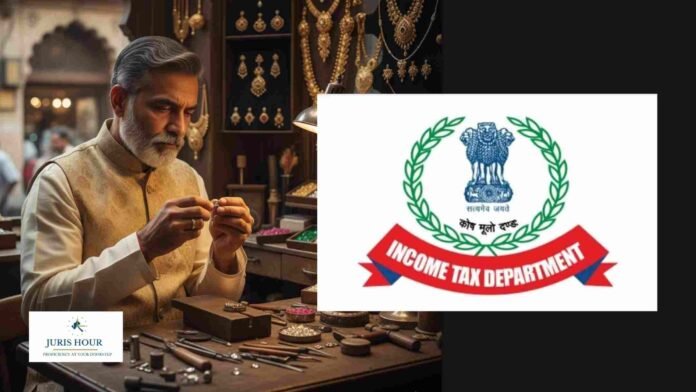The Madurai Bench of the Madras High Court has set aside the orders of the Sales Tax Appellate Tribunal and the Appellate Assistant Commissioner, restoring the original tax assessment in a case involving large-scale suppression of turnover in the gold jewellery business.
A Division Bench comprising Justice P. Velmurugan and Justice K.K. Ramakrishnan allowed a Tax Case Revision filed by the State of Tamil Nadu, finding that purchases and sales worth over ₹1.27 crore were deliberately omitted from the books and subsequently disguised as “job work” transactions.
Inspection Uncovers Concealed Gold Transactions
During a surprise inspection on November 14, 1996, tax officials unearthed serious irregularities in the accounts of a jewellery establishment. Purchases of gold worth nearly ₹12 lakh and unrecorded sales exceeding ₹12 lakh between July 1996 and March 1997 were discovered. Investigators also found unaccounted transactions involving more than 2,000 grams of gold, stock variations, and suppressed turnover exceeding ₹60 lakh.
Including additional omissions and discrepancies, the total suppressed turnover was calculated at ₹1.22 crore. A subsequent income tax raid in March 1997 revealed excess cash and unaccounted stock valued at ₹4.94 lakh, taking the total suppression to ₹1.27 crore.
Seized Notebooks and Admission Strengthen Case
Officials seized two private notebooks indicating that 5,382 grams of old gold ornaments were issued to goldsmiths, while only 3,951 grams of finished jewellery were returned — none of which was reflected in the official accounts. During the inspection, the dealer admitted to these discrepancies.
However, in appeal proceedings, the explanation shifted. The dealer claimed the transactions represented “coolie conversions” (job work) rather than taxable sales. This argument, though unsupported by vouchers or acknowledgments, was accepted by the Appellate Assistant Commissioner and upheld by the Tribunal, leading to deletion of the additions.
State Argues “Afterthought” Defence
Challenging the deletion, the State contended that the “job work” explanation was a belated tactic to evade tax liability and had not been raised during the initial inspection. The assessing officer, relying on seized materials and admissions, was justified in bringing the suppressed turnover to tax and imposing penalties.
The State further argued that the Tribunal erred by accepting the dealer’s unsubstantiated claims without verifying any documentary evidence and by substituting its view for the findings of the assessing officer, who was best positioned to evaluate the evidence.
High Court Restores Assessment
The Madras High Court agreed with the State’s position, observing that the inspection revealed deliberate and large-scale suppression rather than minor accounting errors. The Bench emphasized that an admission made at the time of inspection carried significant evidentiary weight and could not be retracted later without proof.
“The plea of ‘coolie conversion’ was introduced only at the appellate stage and lacked corroborative evidence. The accounts were clearly manipulated after the inspection to justify the omissions,” the Court held.
Finding no justification for the interference by the appellate authorities, the Court restored the original assessment order and upheld the tax liability.
The Bench allowed the revision petition, answering all substantial questions of law in favour of the Revenue. The assessment order was reinstated, bringing the ₹1.27 crore suppressed turnover back into the tax net. No order was made as to costs.
Case Details
Case Title: State of Tamil Nadu Versus Tvl.Alagar Jewellery Mart
Case No.: Tax Case (MD).No.130 of 2012
Date: 26.09.2025
Counsel For Petitioner: J.K.Jeyaselan
Counsel For Respondent: S.Karunakar
Read More: Freight Space Trading & Export Services Not Taxable Under Service Tax: CESTAT

